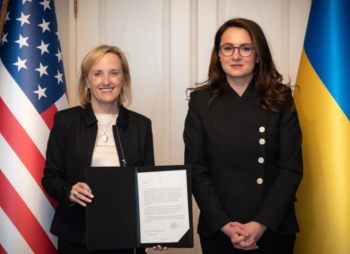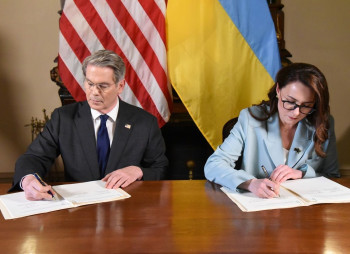I started my career in a company called “MIND CTI”. It is an Israeli hi-tech public company, traded at NASDAQ, NY. In several years, I became the Chief Architect. One of my activities there was to set up an R&D-center for the company, at that time in Romania. I started with five guys and after five years I had 230 guys there. I said to myself: “If I’m so good in doing something like that, why do I do it for another person? I can do it for myself”.
But at that time Romania joined the EU, so it didn’t make sense to do it there anymore, because the prices started to go up, and the good developers started leaving Romania. So I started looking for other locations in Central and Eastern Europe. That could be interesting for me. And I decided to start my company in Ukraine. The talent pull in Ukraine is much bigger than the one in Romania, the education system is better, the prices seemed right.
I didn’t know anything about your country at that time: neither language nor culture. I didn’t have any connections, but I said that this is something typical for Israel entrepreneurs. They are not afraid of difficulty. They just try.
IT-market in Ukraine is stable. Meaning, on one hand the demand for developers worldwide is always growing. Basically, there are several technological trends, like the clould trend, the BYOD (bring your own device) and the mobile applications trend, that is generating a really big demand for developers worldwide. This profession is really the profession of the world. The world is flat, meaning, you can be a company in Singapore searching for the team in Kiev. This is a really global industry, and the location is less important. Of course, I wouldn’t say it’s not important at all, because one of the difficulties we have that the company located in Singapore and the team is in Ukraine. It’s time differences and cultural differences.
But it’s much easier, in this specific industry, to have a global business where the development can be done anywhere. That means that there is a worldwide demand for developers that Ukraine is affected from it. Ukraine also enjoys this worldwide demand. On the other hand with regards to Ukraine there is the current geopolitical situation. Simply put, it is a war, whether we call it like that or not, it is a war with Russia!
Some of the companies which are active in Ukraine, especially big US companies, are becoming more and more sensitive to the situation in Ukraine and less tolerant to the risks. When one is setting up a development center, he is making a huge investment. And US companies expect to see the Return on Investment (ROI). If you are a bank in the USA, for example, and you have an R&D center of 100 people in Ukraine, you, probably, made an investment of several million dollars in it. It is a strategic investment for long term, and you will be really afraid that this investment can be lost because of something you can not control. Some of the US companies canceled or moved big projects that were done here, in Ukraine, to other locations.
So there is two opposite two trends. One trend is the growing demand for developers, which is worldwide and also affects Ukraine, and the other trend that is specifically for Ukraine is cancelations of projects due to the geopolitical situation.
Again, I do not have an accurate statistics, I don’t think that someone has accurate statistics, but as a mid-size company, with two hundred developers, and after talking with many of my colleagues who have other IT-companies, the current outcome of that situation is stability in the sense that these two trends almost cancel each other. The demand for IT-services in Ukraine is on a stable level, not increasing like it was before the war. Because, on one hand, there is an increase, on the other hand is cancelation of projects.
Talking about the forecast, I’m optimistic in general. If I look at the macro-level, Ukrainian developers are really good; education system needs to be updated, but in general it is good too. The labor arbitrage between Ukraine and the western market will continue for at least five to ten years. So, if you look at five to ten years forecast, the current main forces, which affect the IT-market, are still there, and they will still be significant in the growth of the IT-market.
For me, the only big enemy for the IT-market at the moment is not the Ukrainian government, who is slow, who is foraftered, who is not really understanding this market. It’s not even Putin, because I don’t think he would really start a full scale war. The greatest enemy is the brain drain. It’s a catastrophe that the best developers in Ukraine are considering leaving the country, and a lot of them are leaving Ukraine these days. This is the trend that was always there – there is emigration from Ukraine to the EU, to the USA, to Canada because people want to have a better life. I think that in the last six months that trend has increased significantly because some people just lost their hope. They saw the changes in Ukraine, the Maidan, and they expected those changes to affect their lives positively immediately. And it didn’t happen. Now it’s becoming even worse. The economy is dropping, and the threat of Putin is here. Ukraine is losing its best sons and daughters, who are moving to the west.
How to stop the brain drain? It’s simple – government should create better life for people here. It is simplistic and idealistic answer, but it is so. If you want my best recommendation to the Ukrainian government – no electricity brakes and enough hot water this winter. That would be a good start…
When foreign investor coming to Ukraine and searching for a startup, he wants to see a legal structure, tax structure and in general – the ability to do business here, in Ukraine, in a safe manner. And that is the biggest barrier regardless of how interesting is the idea and how strong are the entrepreneurs. The idea could be great, and the entrepreneurs could be really strong, but is it possible to setup the business in Ukraine? If I can compare it to Israel, for example: If there is an investor, who is looking to invest his money to a startup, he checks two main things: the potential of the idea and the entrepreneurs themselves. Are they are strong enough? Do they understand their business enough? Are they motivated enough to succeed?
In Ukraine, there is another layer – the layer of what is my chances that my investment will not go down because of changes in geopolitical, legal or economical situation. At any given time somebody may come from the government and change the tax scheme, and suddenly the whole business collapses because of changes in taxes or some other legal scheme, that suddenly invalidates the whole business. This level of uncertainty that is something very specific for Ukraine and is not really attractive for investors.
So first thing, the general ability to do business in Ukraine is not really favorable for investors. Secondly, if you compare the Ukrainian and Israeli entrepreneurs, what I see here in Ukraine is very strong technological capabilities, a lot of motivation. Probably, even bigger than what I see at the moment in Israel because of the hunger to succeed in Ukraine. It is the world society already, and the lack of thing here, in Ukraine, creates a lot of ambition, which is good. High motivation is, probably, the best fuel for an entrepreneur.
But, on the other hand, in Ukraine I see less of understanding of the business aspects of having a High-tech company. It’s not enough to have a good idea. You need to create the right strategy for marketing, for sales, for business development, and to be able to manage the company through its lifecycle. From an idea to a prototype, get initial fundings, then take this prototype into a real product and then to start selling the product in the most efficient way. If I could compare with Israel twenty years ago – this is the situation I see now in Ukraine. Twenty years ago in Israel there was very much similar situation. Lots of entrepreneurs with high motivation, great ideas, but lack of understanding of how to turn this idea to a real business. How to do the sales and business development. And that’s, eventually, the lifeline of the business. I think Ukrainian entrepreneurs still have a path to go and an experience to gain.
There is geopolitical and economical crisis in Ukraine. But if you look at the IT-companies or the startup scene, they get some benefit from this situation. First of all, it’s financial: the fall of the hryvnia that lost almost 60% of its value in half a year. For local business, it’s a catastrophe. For businesses that are importing it’s even harder. If I have a business and I import, lets say, iPhones into the country, than the price of iPhones, probably, will increase significantly, because you buy it in dollars and you sell it in the local market in hryvnia. But salaries didn’t increase. So, probably, much fewer people now are able to buy iPhones. So this business is dramatically affected.
If you look at startups, or IT-companies, the situation is completely the opposite. Most of the revenues are coming in dollars and in euro, hard currencies, which keeps their value, and the expenses are in hryvnia. So, every IT-company or startup has less expenses.
Giving some advices to the Ukrainian startups, I would say, think of the business, build your business plan, a marketing plan, a sales plan. Find the right people to do sales. Try to hit the market as soon as possible. Meaning, don’t sit down and develop the spaceships for two years and only after that start selling them. Develop something small, enough to get initial feedback from the market and start attacking the market. Use the strength that Ukraine has: The fact that you can currently cost-effectively recruit people here, in Ukraine, can be beneficial. If you want to hire a sales person in Germany, in the USA, in the UK, it’s a lot of money. Here, you can hire online marketing team in Ukraine for relatively low price, and try to find a business model, where you can do most of your sales online.
If you manage to find a business where the business model is based on online marketing and it’s a solid business, then you can use the power of cheap labor force, that you can find in Ukraine, to reach sales relatively fast and start building your business by creating revenues fast. This is something that has to be done in Ukraine, because the ability to raise funds is very limited. It’s very hard to get credit line from the bank, the investment community here is relatively small. You’d probably be able, if you have a good solid business and you can only demonstrate sales, you will find an investor even in Ukraine. Because finding investor for a startup is just like in marriage: every wife somewhere has a potential husband, it’s just a matter of finding the right one. If you have a good working product and you are ready to demonstrate the ability to do sales, you will find your investor. But reaching this point is not easy in Ukraine and the best way to do it is to develop a lean online marketing model where you can do most of your sales online, take advantage of the cheap labor costs, which could be found in Ukraine and reach revenues relatively fast.
Interviewed by Mila Lerner / InVenture Investment Group






